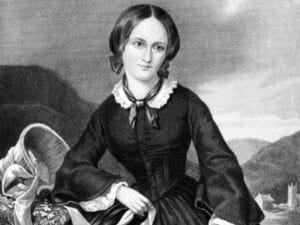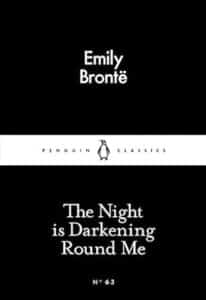Emily Brontë was more than the author of Wuthering Heights. She was an accomplished poet
Thanks to Fyodor Dostoevsky, I discovered Emily Brontë the poet.
I was in the gift shop of St. Martin-in-the-Fields Church at Trafalgar Square. We’d eaten lunch at what we consider “home base” in London — the Crypt of St. Martin’s, a café and often a venue for jazz combos and other musical events. Next to the Crypt is the church’s gift shop, with a wide array of merchandise designed to appeal (tastefully) to tourists. Like us.
I was moseying around a table which featured, among other things, a small display of Penguin Little Black Classics. Penguin publishes some 80 and counting of these little gems — long short stories, poetry chapbooks, long poems, and other short works by classic authors. My eye went to White Nights by Fyodor Dostoevsky, primarily because I was unfamiliar with it. Next to it was a book with a fascinating title — The Night is Darkening Round Me by Emily Brontë.
Brontë (1818-1848) is, of course, the author of Wuthering Heights. I read it in high school and college, and I still retain images of the brooding Heathcliff, wandering the moors of northern England. I saw The Night is Darkening Round Me, and I assumed it must be an excerpt from the novel.

Emily Brontë
I was wrong. It was a collection of Brontë’s poetry, taken from a larger collection published in 1992. My surprise betrayed my ignorance. Emily Brontë was a poet, too? As it turns out, in her short life, she was a poet before, while, and after she was a novelist. In 1846, with her sisters Charlotte and Anne, she published a collection simply entitled Poems, the authors identified as Currer, Ellis, and Acton Bell. It sold two copies (most contemporary poets will sympathize). Emily had 21 poems in the collection; in her lifetime, she wrote nearly 200.
Wuthering Heights was published in 1847, and it became her signature work. Nearly a century passed before her poems were collected and published (in 1942 wartime Britain). In 1992, Penguin published The Complete Poems, which included both completed poems and some fragments or uncompleted poems. The Night is Darkening Round Me includes 24 complete poems and six uncompleted poems, functioning as a kind of Brontë chapbook. It’s difficult to read the poems and not see the title as a collective premonition of her early death.
The poems are beautifully written, covering topics as diverse as imagination, a daydream, the shining sun, memory … and death. Death is an especially strong theme, and it’s not surprising. Nineteenth century Britons were far more familiar with death than their 21st century descendants. Infant mortality was common; 25 percent of children died before the age of five. Average life expectancy was 42. The Brontë family was especially hard hit. Emily and brother Branwell died in 1848 at 30 and 31, respectively. Anne died at 29, and Charlotte lived to only 38. Officially, the cause for all four was believed to be tuberculosis, but later groundwater investigations showed they may have been drinking contaminated water.
One poem in the collection that is about death is, appropriately enough, also about hope. And yet it is a negative perspective. Hope is timid, cruel, oblivious, often false, and definitely unreliable.
Hope

She sat without my grated den
Watching how my fate would tend
Even as selfish-hearted men.
She was cruel in her fear.
Through the bars, one dreary day,
I looked out to see her there
And she turned her face away!
Like a false guard false watch keeping
Still in strife she whispered peace;
She would sing while I was weeping,
If I listened, she would cease.
False she was, and unrelenting.
When my last joys strewed the ground
Even sorrow saw repenting
Those sad relics scattered round;
Hope – whose whisper would have given
Balm to all that frenzied pain –
Stretched her wings and soared to heaven;
Went – and ne’er returned again!
Finding The Night is Darkening Round Me in the gift shop turned out to be an unexpected pleasure. At a young age, Emily Brontë was an accomplished poet who just happened to write a novel that became her major literary legacy. But to read her poems is to understand at least some of the origins and influences that created Wuthering Heights. (And a belated thanks to Mr. Dostoevsky.)
Photo by Matt Deavenport, Creative Commons, via Flickr. Post by Glynn Young.
How to Read a Poem uses images like the mouse, the hive, the switch (from the Billy Collins poem)—to guide readers into new ways of understanding poems. Anthology included.
“I require all our incoming poetry students—in the MFA I direct—to buy and read this book.”
—Jeanetta Calhoun Mish
- “Horace: Poet on a Volcano” by Peter Stothard - September 16, 2025
- Poets and Poems: The Three Collections of Pasquale Trozzolo - September 11, 2025
- Poets and Poems: Boris Dralyuk and “My Hollywood” - September 9, 2025


Bethany says
“I looked out to see her there
And she turned her face away!”
What tragedies she endured. Thank you for pointing out her poetry to us.